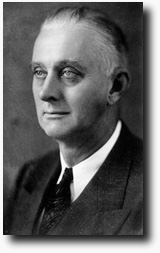


Honoree for Pioneer Lecture for 1998 Dr. Wilmon Newell was born at Hull, Iowa, March 4, 1878. He spent the
early years of his life in Iowa. He received his B.S. degree from Iowa State College in
1897, his M.S. degree in 1898, and his honorary Sc.D. in 1920. Clemson College also
conferred the Sc.D. degree on Dr. Newell. Dr. Newell was assistant in Entomology at the
Iowa Agricultural Experiment Station from 1897 to 1899. He held the same position at the
Ohio Agricultural Experiment Station from 1899 to 1902. From 1902 to 1903, he was
Associate Entomologist and Apiarist at the Texas Agricultural Experiment Station. From
1903 to 1904, he was State Entomologist of Georgia. From 1904 to 1910, he was Entomologist
of the State Crop Pest Committee of Louisiana. In 1910, he returned to Texas as
Entomologist of the Experiment Station and State Entomologist, a position which he held
until 1915, when he came to Florida as Plant Commissioner of the State Plant Board. The
State Plant Board was created with the Florida Legislature's approval of the Plant Act 30
May 1915. The Plant Act was adopted primarily for the eradication of citrus He had a taxonomic interest in ants and collected extensively for the Argentine ant in the gulfcoast area, particularly in Louisiana. His ant collection is in the Florida State Collection of Arthropods, Division of Plant Industry, Florida Department of Agriculture and Consumer Services in Gainesville. (The State Plant Board became the Division of Plant Industry in 1960 which is one of 10 divisions in the Florida Department of Agriculture and Consumer Services). Dr. Newell pioneered in the research for the boll weevil control in Louisiana, had a deep interest in apiary work in Texas and other states, but was best known for his activities in pest control and eradication of plant pests. He directed the first Mediterranean fruit fly eradication program in the world in Florida in 1929 and 1930, the citrus canker was eradicated in Florida in the early 1930's, and the citrus blackfly was eradicated in Florida in 1935. During his long career he published technical papers on apiculture, cotton insects, scale insects, quarantine programs and procedures, and insect eradication. Some of his finest research was on the control methods for the cotton boll weevil,, the Argentine ant, and the eradication of American foul brood in honey bees. Dr. Newell's tremendous zest for work and executive ability were responsible for the number of administrative positions he held and in great part accountable for the prominence of the Florida Agricultural Experiment Station in the 1920's through the 1940's. Those who were privileged to know him intimately were struck by his He gave his very life to his work and his only regret as he faced the end of his journey was, in his own words, "that I shall not be permitted to do the many other things that I had planned f or Florida agriculture and for my associates." Dr. Newell attained many honors. He was a member of the advisory council
of the Southern Forestry Experiment Station of the Southern Forestry Service; member and
president in 1920 of the American Association of Economic Entomologists; charter member of
the Cotton States Branch of the Association; member and president in 1929 of the
Association of Southern Agricultural Workers; University of Florida representative of the
Institute for Research in Tropical America; member of the Soil Science Society;
administrator of Florida State Soil Conservation; chairman of the Florida Land-Use
Planning Committee; and chairman of the Advisory committee on Agriculture of the Florida
Defense Council since 1941. He was also a Mason and a Shriner; a member of Kappa Sigma
social fraternity; and member of the honorary fraternities of Alpha Zeta, Phi Kappa Phi,
and Gamma Sigma Delta. The students in the In the passing of Dr. Newell, the science of entomology lost one of its most eminent members and southern agriculture one of its great leaders. |
Website Design Copyright © 1998 Colony One On-Line, Inc.
All Rights Reserved.